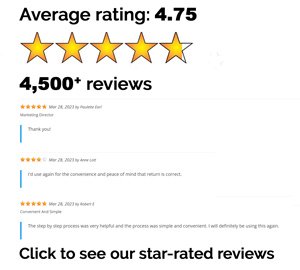The information in this article is up to date for tax year 2023 (returns filed in 2024).
Do I have to file a file a tax return? There’s no cookie cutter answer for who needs to file a federal tax return. Whether you need to file a tax return is based on your age, filing status and income. Even if you think you don’t need to file, or don’t owe any tax, it’s still worth taking the time to file a tax return because you may be about to get some money back.
What are the filing requirements?
Most U.S. citizens or residents will be required to file based on their age, income and filing status. If you meet the following criteria, you’ll need to file a tax return.
| Filing status | Age at the end of 2023 | Income |
| Single | Under 65 | $13,850 |
| 65 or older | $15,700 | |
| Married filing jointly | Both spouses under 65 | $27,700 |
| One spouse 65 or older | $29,200 | |
| Both spouses 65 or older | $30,700 | |
| Married filing separately | Any age | $5 |
| Head of household | Under 65 | $20,800 |
| 65 or older | $22,650 | |
| Qualifying surviving spouse | Under 65 | $27,700 |
| 65 or older | $29,200 |
How much can a dependent make before having to file taxes?
If someone provides more than half of your financial support, they can claim you as a dependent on their tax return. Dependents are subject to different filing requirements. You must file a tax return if any of the following applies to you:
Single dependents
| Under 65 | 65 and older | 65 or older and blind | |
| Your unearned income was over | $1,250 | $3,100 | $4,950 |
| Your earned income was over | $13,850 | $15,700 | $17,550 |
| Your gross income was the greater of | $1,250, or your earned income (up to $13,450), plus $400. | $3,100, or your earned income (up to $13,450), plus $2,250. | $4,950, or your earned income (up to $13,450), plus $4,100. |
Married dependents
| Under 65 | 65 and older | 65 or older and blind | |
| Your unearned income was over | $1,250 | $2,750 | $4,250 |
| Your earned income was over | $13,850 | $15,350 | $16,850 |
| Your gross income was the greater of | $1,250, or your earned income (up to $13,450), plus $400. | $2,750, or your earned income (up to $13,450), plus $1,900. | $4,250, or your earned income (up to $13,450), plus $3,400. |
You will also be required to file if your gross income is at least $5 and your spouse files separately and choose to itemize their deductions.
Other situations that require you to file
You must file a tax return if any of the following conditions apply.
- You received distributions from a health savings account, Medicare Advantage MSA, or Archer Medical Savings Account
- Advance payments of the premium tax credit were made for you, your spouse, or a dependent who are enrolled in a Health Insurance Marketplace plan.
- You owe:
- Alternative minimum taxes.
- Taxes on an individual retirement arrangement (IRA) or other tax-favored account.
- Social security or Medicare tax on tips you didn’t report to your employer, or they didn’t withhold from your pay.
- Uncollected social security, Medicare, or railroad retirement tax on tips you reported to your employer or on group-term life insurance and additional taxes on health savings accounts.
- Taxes on household employees.
- Recapture taxes.
- You earned $108.28 or more from a church or qualified church organization.
What is the filing requirement for self-employed individuals?
You must file a tax return if your net earnings from self-employment were at least $400.
Should you file a tax return if you are not required?
Even if you aren’t required to file a tax return, you may still be eligible for a refund. You may be able to get some money back if:
- You had income taxes withheld from your paycheck.
- You qualify for the Earned Income Tax Credit.
- You qualify for the Additional Child Tax Credit.
- You qualify for the American Opportunity Tax Credit.
- You qualify for the Premium Tax Credit.
- You made estimated tax payments or had last year’s refund applied to this year’s estimated tax.
File your taxes fast and ez with 100% accuracy.
The articles and content published on this blog are provided for informational purposes only. The information presented is not intended to be, and should not be taken as, legal, financial, or professional advice. Readers are advised to seek appropriate professional guidance and conduct their own due diligence before making any decisions based on the information provided.




